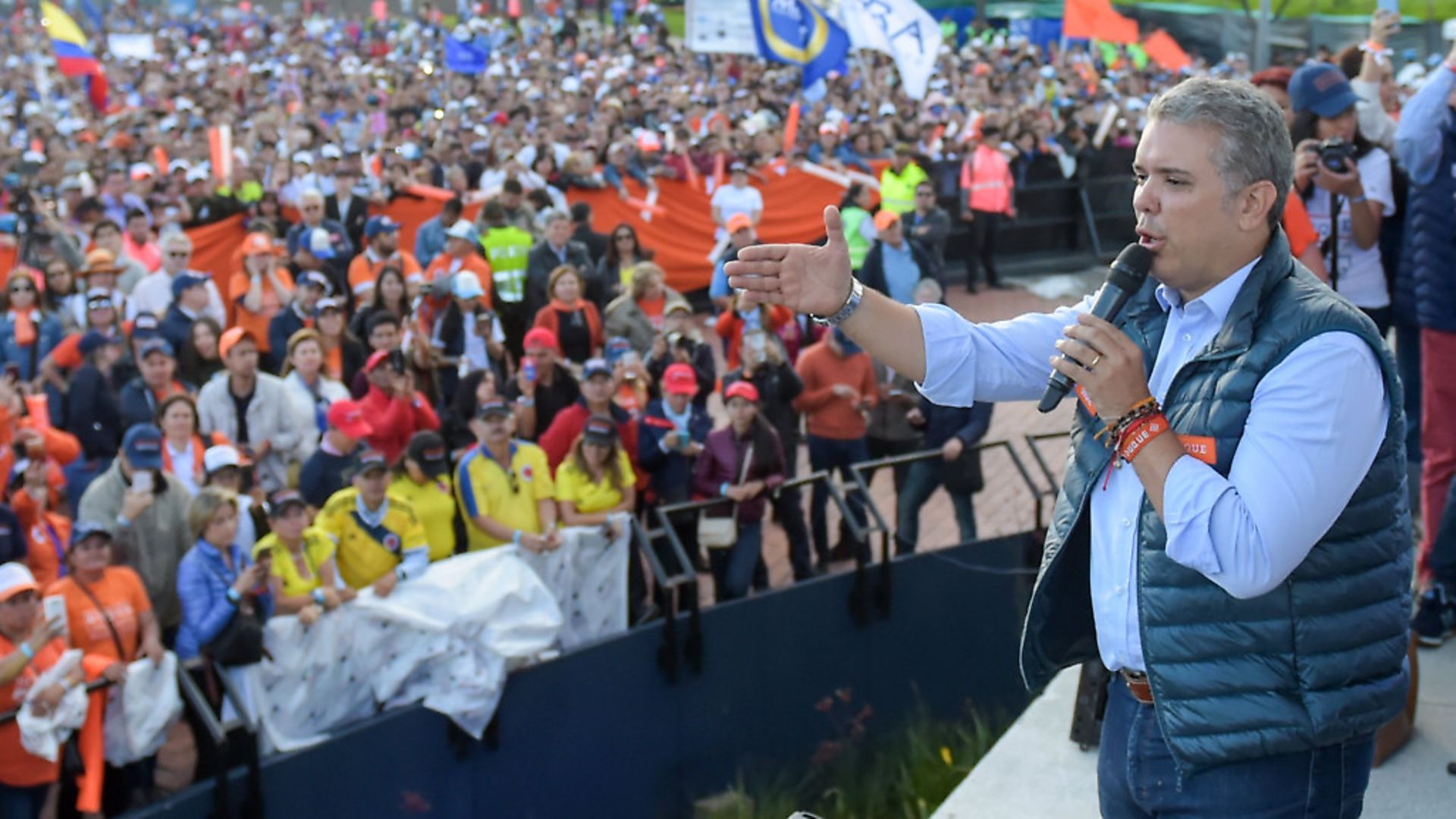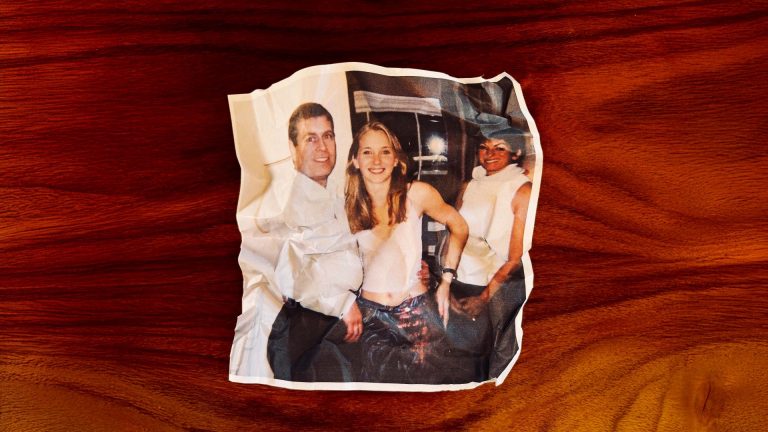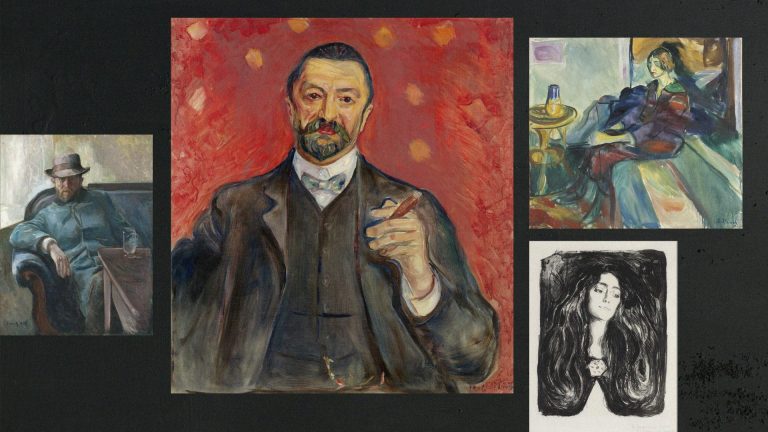
Will Colombia’s elections return it to conflict? WILL WORLEY reports from Bogota on a country still grappling with the consequences of its own controversial 2016 referendum
Two years into a historic peace deal but facing numerous challenges, from economic woes to regional insecurity, Colombia is on the brink of one of the most important elections in its history.
Among the five candidates in the presidential elections – held this weekend – there is a former guerrilla, a mathematician, and a man missing several fingers as a result of an assassination attempt involving a book bomb. But of all the hopefuls, one man has consistently led the race: Iván Duque Márquez.
Duque is not only the most successful candidate in Colombia’s polling, but also one of the most controversial. While he presents himself as a new generation consensus builder, among many opposition voters the prospect of his victory inspires genuine fear. As Colombia tries to heal itself from decades of bloody conflict, Duque is the only candidate who wants to change the fragile 2016 peace deal with the Revolutionary Armed Forces of Colombia (FARC). Many are scared his policies could plunge the country back into violence.
Duque was born into an elite family. His father, Iván Duque Escobar, was governor of the north-western department of Antioquia, and also held a number of government positions. His son was educated at elite universities in Bogota and the USA. After a spell as an advisor in the Colombian Ministry of Finance, Duque spent over a decade at the Inter-American Development Bank in Washington DC, with stints in diplomacy.
Duque only became a senator in 2014, and at just 41 years old, if elected, he would be Colombia’s youngest-ever president. He is said to be highly personable and enjoys football and listening to hard rock.
But his lack of political experience and youth has given rise to criticism, even mockery. Rumour has it he dyed his hair grey in order to give himself more gravitas (his supporters put it down to stress).
His age and inexperience have led to many accusing him of being a títere, or puppet, of previous president Álvaro Uribe Vélez. While Uribe (now a senator) has been forced to publicly deny he is not pulling Duque’s strings, there is widespread belief to the contrary.
Uribe, who served between 2002-2010, was known for his extremely hawkish stance, especially on the FARC, and is credited with inflicting a series of defeats on the group. But his victories came at a cost. ‘His history in terms of human rights and connections with paramilitaries is highly problematic,’ says Gimena Sánchez, Andes director at the Washington Office on Latin America, a human rights organisation.
‘This was a time when more than 6,000 people were extra judicially killed by the armed forces,’ she adds. Indigenous people also suffered one of their worst periods in history, Sánchez says, ‘because Uribe didn’t respect any of their rights, even in terms of being humans.’
Uribe has also been linked to numerous scandals, including accusations of connections to Pablo Escobar’s Medellin Cartel, but he remains a hugely powerful figure in Colombian politics, commanding a solid upper-class support base who laud his achievements against the FARC.
It was through Uribe’s right-wing Centro Democratico (Democratic Centre) party that Duque speedily ascended as senator, and then to presidential candidate. He has made no secret of his admiration for Uribe, calling him Colombia’s ‘eternal president’.
Duque’s connection to Uribe – and similarly hawkish policies – are a prime cause of concern for those who wish to avoid a return to the bloodshed of the past. As well as FARC dissidents and criminal gangs, Colombia’s next president must also tackle the National Liberation Army (ELN), another leftist guerrilla group.
‘We must have the capacity to react on FARC dissidence and recover the territory where the ELN is today,’ Duque told El Tiempo earlier this month. ‘There cannot be a square meter in the country where the state does not have control.’
While his presidential campaign has broad appeal, Duque was a leading ‘No’ campaigner during the referendum on the peace deal with FARC. His side narrowly won, but the accords were pushed through Congress anyway.
The costly deal promised a bundle of policy reforms and reintegration programmes for the former guerrillas, in exchange for demobilisation, disarmament and reduced prison sentences.
But progress has already been achingly slow, and many suspect Duque wants to degrade it further.
‘He could very well have the peace agreement not work by not advancing it, not giving it resources or priority, or introducing other legislation,’ says Sanchez. ‘And that would be highly problematic.’
Duque has said he wants to make ‘significant changes’ to the complex and delicate peace process, which saw FARC transition into a political party. Among other alterations, he would end an amnesty on pre-2016 drug trafficking offences, which many senior FARC were embroiled in.
Duque has taken a strong stance against the cultivation of coca, the crop used to make cocaine. According to Ivan Briscoe, Latin America programme director at the International Crisis Group, this is because Duque believes ‘it illustrates the state’s lack of control over its territory… and is where [armed groups] find their revenue and possibilities for expansion.’
This stance highlights the prospect for regression in drug policy, analysts say, which in recent years has sought to address the root causes of coca cultivation in poor rural areas.
A much harder line would also be taken by Duque against the ELN – which he has called ‘a bloodthirsty, terrorist organisation’ – and peace talks with the group would likely be suspended.
‘The belief is that if Duque were to take on a more Uribe role, it would completely destroy the peace process and generate violence and new displacement,’ says Sanchez. She adds that increased inequality, which ‘fuelled all these cycles of violence and illegal economies,’ could be another consequence.
Among those most fearful of a Duque victory are 7,000 former FARC fighters. The majority see the current government of Juan Manuel Santos as having not lived up to the promises it made under the accords. Many languish in remote rural camps, far from basic services, awaiting the reforms promised to them. Mistrust of the government – their traditional enemy – is already running high.
‘Ninety per cent of guerrillas are afraid of a Duque victory, they know war will come again,’ says one former FARC member. He adds: ‘Lots of people will return to the mountains and many will try to leave the country.’
Disgruntled ex-fighters – who have little education or training – are vulnerable to recruitment by FARC dissidents or other armed groups, observers say.
To his many supporters, Duque represents different things. Some simply want him in power because of his stance against corruption and clean record – an advantage of his apolitical past. Other attitudes reflect Colombia’s uneasy history. ‘In this country, in the last 20 years, people haven’t voted for who they like,’ says Orlando Cruz, 53, a small business owner from Bogota. ‘People voted to keep another person out. When I vote for Duque, it’s to vote against Petro. I will vote against anything that is communist.’
Leftist candidate Gustavo Petro is a former member of the M-19 guerrilla group, who went on to serve as mayor of Bogota. He was a bitter rival to Uribe and is considered Duque’s closest competition in the election. The Colombian right has made much of Petro’s leftist credentials and guerrilla history, particularly invoking fear of the Chavista politics which have caused so much misery in neighbouring Venezuela.
But other supporters take a more optimistic approach to Duque’s candidacy.
‘Young people like Duque, his plans for entrepreneurship and helping lower-income people start businesses,’ says Francelina Alférez, 25, a political aide.
Like 50.2% of participating Colombians, Cruz and Alférez voted against the proposed peace agreement in the 2016 referendum. Many still feel FARC got off lightly. ‘People say we are enemies of the peace process but we are not,’ Alférez says. ‘We don’t want to destroy the agreement, we want to improve it.’
She continues: ‘We agree to peace, but people must pay for their crimes. There are many victims who want the truth. We need a balance between justice and compromise. If they want to go into politics, and have power, they must admit everything. If they did bad things, they have to pay for that.’
Alférez and other conservatives admire Uribe’s record against the guerrillas and recall how much safer the country has become since his tenure. But Alfarez does not deny the prospect of further violence if Duque follows Uribe’s example. ‘Maybe for one or two years it would be worse again, but after it would improve,’ she says, adding: ‘In the future, if no action is taken, the FARC dissidents’ power could increase. They will be the same terrorist group again, because we didn’t do anything.’
Duque is by no means guaranteed the presidency, and Colombian polls are notoriously unreliable. But whoever wins, their tenure is unlikely to be placid.






